PDF chapter test TRY NOW
“In the Kingdom of fools” is an interesting Kannada folktale taken from A K Ramanujan’s “Folk Tales from India”.
Once upon a time, there lived a king and his minister. They were considered to be idiots because they lacked intelligence and seemed to be fools. The reason behind the statement was that the king and his minister wanted to change their kingdom to a new one. They made the decision that they did not want to rule their kingdom like other kings. So, they thought of different plans to make some changes in their kingdom.

A foolish king
At first, the king and his minister planned to change night into day and day into night. It was impossible to turn night into day and day into night, as it is a natural phenomenon. However, the story did not refer to the changeover from day to night. It meant that whatever work should be done during the day should be done in the night, and vice versa. For instance, usually, people used to work in the fields or shops throughout the day. But the people of the foolish king’s kingdom were ordered to work in the fields or run their business at night. When the sun rises, the kingdom’s citizens will have to go back to bed and sleep.

People would sleep during day and work at night
On the other hand, the people were unable to speak out against their king. If they raised their voices against the king, they would be sentenced to death. So people were afraid of the foolish king and his official. They were dissatisfied with the new rules. The kingdom’s citizens had no other options. If they wanted to stay in the city, they had to obey their king or else the king would punish them. Later the king and the minister became delighted because their plan got succeeded. Gradually, everything started to change according to their desires.
While the strange things were happening in the city, a guru and his disciple came to the city. The city seemed to be very beautiful. As it was daytime, the guru and his disciple could not find a single person outside the home or street. They were surprised to see that no one was there. As the guru and the disciple were new to the city, they were unaware of the kingdom’s new rule.
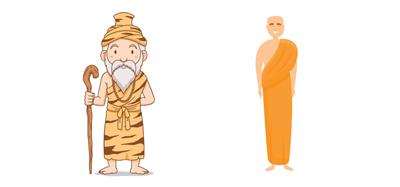
A guru and his disciple
Nobody in the city was awake, and not even a mouse could be seen outside. It signified that not only the humans were accepting the orders but also the mouse were following the foolish king’s command. On the other hand, cattle like cows, goats, and sheep were trained to sleep during the day. Therefore, the total kingdom was found to be asleep during the daytime.

Mouse and cattle were sleeping during the day
The guru and his disciple roamed here and there till evening because they could not find anyone in the town. The night had come. Immediately, the whole town woke up from their sleep. People came to their shops and fields to start their night work.
The guru and his disciple felt very hungry because they roamed in the city from morning till evening. When they saw the shops were opened in the nighttime, the two of them went to buy some groceries. They were astonished when they heard the prices of the food item. Everything sold in the shop was for a single duddu. The term "duddu" implies a rupee.
The guru and his follower observed that everything was sold for a rupee, whether they bought a bunch of bananas or a measure of rice. The low price of the food item and groceries were also among the new rules passed by the foolish king and his minister. The guru and his disciple were delighted when they learned of the low price. They haven't heard about the strange things anywhere before. So they thought of purchasing all of their necessities for a rupee.

A bunch of bananas or a measure of rice
The guru and his disciple went out to cook food after purchasing the essential items from the shop. After cooking, they had a good dinner. Later the guru realised that this kingdom was full of fools. His statement was driven by the strange events that had occurred in the city. The guru knew that if the groceries or food items were sold for a low price, the people would not earn any profit. Later, he could sense some danger in the city because he was a wise person. As a result, he felt that it was not safe to live in this city. So he informed the disciple that it was not the right place to stay and leave the place immediately. The disciple, on the other hand, never paid attention to the guru's words. The disciple claimed that if he left the city, he would buy everything for a higher price. So he decided to stay in the city and enjoy the wonderful food at a lower cost.
The guru then tried to convince his disciple in all the possible ways by stating that the city was full of fools. If he stays there, he will soon experience some misfortunes. He said that all of these good fortunes would come to an end soon and that he couldn't predict what the people would do to the disciple next. However, the disciple was an outsider, as well as he did not belong to that city. If any problem occurs, he would be the first person to be caught in trouble. Even after hearing the guru's words, his disciple never bothered about future problems. He was mainly interested in eating good food at a low price. 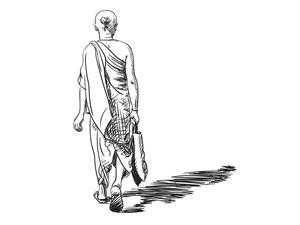
The guru then tried to convince his disciple in all the possible ways by stating that the city was full of fools. If he stays there, he will soon experience some misfortunes. He said that all of these good fortunes would come to an end soon and that he couldn't predict what the people would do to the disciple next. However, the disciple was an outsider, as well as he did not belong to that city. If any problem occurs, he would be the first person to be caught in trouble. Even after hearing the guru's words, his disciple never bothered about future problems. He was mainly interested in eating good food at a low price.
The disciple did not listen to the guru's words. He desired to stay in the fool's kingdom. Later, the guru realised that his disciple was not going to accompany him in any case. So he decided to leave the city and told his disciple “Do what you want. I’m going".

The guru left the city
The disciple stayed in the city for several days. He consumed as much as he could. Every day, he ate bananas, ghee, rice, and wheat to keep his tummy full. Because of the low price, he ate whatever he wanted and eventually grew fat. At last, the disciple became like a street-side sacred bull. Here the phrase “street-side sacred bull” meant that he would chew the food like a bull and seemed to sit simply without doing any work. It made him fatter than he had been previously.
Later, on a bright day, a thief came to steal things from a merchant’s house. Since the people in the foolish kingdom would sleep during the day, the burglar would prefer to steal at that time.
Later, on a bright day, a thief came to steal things from a merchant’s house. Since the people in the foolish kingdom would sleep during the day, the burglar would prefer to steal at that time.

A thief
The thief then made a hole in the wall to enter inside the merchant's house. After plundering the house’s valuables, he came to escape through the hole. Unfortunately, when he attempted to exit, the ancient house wall collapsed on his head. The thief eventually died.
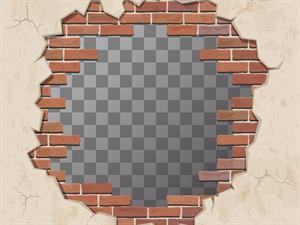
The thief made a hole in the wall
Then the thief's brother ran to the king’s palace to seek justice. When he met the king, the thief's brother said that the wall had fallen on his brother’s head while he was pursuing ancient trade. The term “ancient trade” signifies theft or stealing someone's wealth. The king’s stupidity was well known throughout the city. So the thief’s brother took advantage of the king’s foolishness and claimed that the merchant had built a weak wall, which was the cause of his brother’s death. The thief’s brother said that his brother would not have died if the merchant had built a sturdy wall. As a result, he petitioned the king to punish the merchant for constructing the weak wall and give justice by compensating his family.

The thief's brother ran to the king’s palace to seek justice
When the thief’s brother demanded justice, the king told him that justice would be done, and he consoled him. The king was so ignorant that he never realised the thief had died while escaping with the stolen valuables from the merchant’s house. He just believed that the thief died due to the wall collapsing on him, and that was the fault of the house owner who had built a weak wall. So he called out the merchant.
The king inquired about the merchant’s name as soon as he arrived at the palace. The merchant replied, “Such and Such, Your Highness.” Here the narrator did not mention any specific names in the story. For instance, while reading the story, all the characters were called out by being their profession like king, minister, thief, merchant, etc.
The king inquired about the merchant’s name as soon as he arrived at the palace. The merchant replied, “Such and Such, Your Highness.” Here the narrator did not mention any specific names in the story. For instance, while reading the story, all the characters were called out by being their profession like king, minister, thief, merchant, etc.
The king then asked the merchant whether he was at his home when the incident occurred. The merchant replied that at the time of incident, he was at his home. The merchant further explained the majesty that the burglar made a hole in the wall to enter inside his residence, and when he tried to leave, the fragile wall fell on him. Later, the king stated that the merchant had murdered the thief, and his brother had come to the palace to seek justice. The only way to give justice for the thief’s death was by punishing the merchant.
After hearing the king’s point, the merchant claimed that it was not his fault. The wall was weak because the person who built it did not do so correctly. As a result, punishing him would be beneficial. He went on to say that the wall was built during his father’s time and that the person who made it was now an old man. Also, he stated that he knew the old man very well and he was staying nearby.
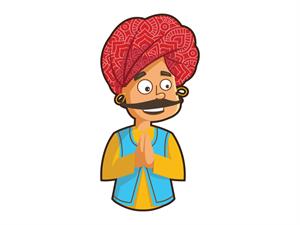
The merchant pleaded the king
While the merchant said that the man who built the weak wall was to be punished, the king sent his messengers to bring the bricklayer. Here bricklayer means a person who build walls, houses, and other structures with bricks. The messengers tied his hands and feet, and he was taken to the king's palace. Then the king enquired whether he built the wall during the merchant's father's time. It meant that the house was built several years back as well as it was an old house.
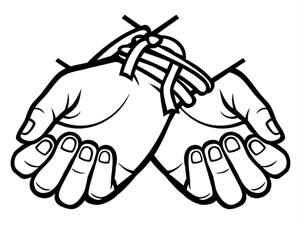
Bricklayer's hand tied with rope
When the bricklayer heard an accusation against him, he said, "Yes, My Lord, I did." Later, the king became enraged and informed him that he had built a weak wall. A poor thief had died as a result of the weak wall. He was killed instantly when the wall collapsed on his head. He also added that the thief's brother had come to pursue justice. As a result, the dead man's justice would be served by killing the person who had built the weak wall.
The bricklayer was terrified when he learned that he had been sentenced to death. As a result, the poor bricklayer pleaded the king. The bricklayer had an idea right away, and he told the king to listen to him before ordering him to be killed. Despite his foolishness, the king listened to everyone's ridiculous stories. The king was completely unaware that everyone was trying to escape from the incident. Afterwards, the poor bricklayer admitted that he had constructed the wall, and it had not turned out well. He began to justify why the wall did not come out as he planned.
When the bricklayer heard an accusation against him, he said, "Yes, My Lord, I did." Later, the king became enraged and informed him that he had built a weak wall. A poor thief had died as a result of the weak wall. He was killed instantly when the wall collapsed on his head. He also added that the thief's brother had come to pursue justice. As a result, the dead man's justice would be served by killing the person who had built the weak wall.
The bricklayer was terrified when he learned that he had been sentenced to death. As a result, the poor bricklayer pleaded the king. The bricklayer had an idea right away, and he told the king to listen to him before ordering him to be killed. Despite his foolishness, the king listened to everyone's ridiculous stories. The king was completely unaware that everyone was trying to escape from the incident. Afterwards, the poor bricklayer admitted that he had constructed the wall, and it had not turned out well. He began to justify why the wall did not come out as he planned.
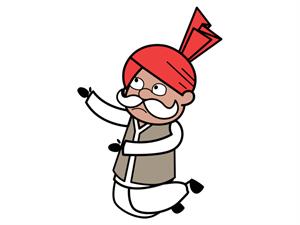
The poor bricklayer pleaded before the king
The poor bricklayer began to tell the story about an incident that happened during the merchant's father's time. While the bricklayer was constructing the wall, he saw a dancing girl passing up and down the street.

An young bricklayer constructing wall long years back (flashback)
The dancing girl wore anklets on her legs. While she was going up and down the street, the jingling sounds of the anklets caused a distraction in the bricklayer's mind. So he was unable to focus on his construction. This was the reason behind building a weak wall. At last, the bricklayer told the king that the dancing girl was the real culprit, and she had to be punished for the weak wall. He also mentioned that he was aware of where she was now residing.

The bricklayer got distracted when she was going up and down the street with her anklets jingling
After hearing the poor bricklayers' point, the king agreed that he was not the real culprit. When the thief's brother came to seek justice, the king expected the case would be over fast. However, after hearing each person's point of view, everything began to change. The king understood that the case became more complicated as time passed, and he needed to come up with a solution. The situation became worse and identifying who should be penalised became complicated. Then the king thought of calling the dancer.
The dancer was brought in front of the king by the messengers. She was an old woman. As she approached the courtroom, the old woman was trembling. The king questioned whether she walked up and down in the street many years before while the bricklayer was constructing the wall. The old woman said that she was the one who had done that. Later the king explained that why she was called out to the courtroom. The king said that the bricklayer was distracted by her jingling anklets as she walked around. As a result, the bricklayer was unable to complete his work perfectly. Finally, he built a weak wall which fell on a poor thief's head, and he was killed. Later the king stated that it was because of her that the thief died, and she would be punished to death.
The dancer was brought in front of the king by the messengers. She was an old woman. As she approached the courtroom, the old woman was trembling. The king questioned whether she walked up and down in the street many years before while the bricklayer was constructing the wall. The old woman said that she was the one who had done that. Later the king explained that why she was called out to the courtroom. The king said that the bricklayer was distracted by her jingling anklets as she walked around. As a result, the bricklayer was unable to complete his work perfectly. Finally, he built a weak wall which fell on a poor thief's head, and he was killed. Later the king stated that it was because of her that the thief died, and she would be punished to death.

Trembling old woman (dancing girl)
Later the dancing girl thought for a minute. She blamed another person. She said that she was roaming around in the street repeatedly because she had to visit the goldsmith’s shop. She had given some gold to him to make jewellery out of it. The dancing girl stated that the goldsmith was a lazyscoundrel. He made lots of excuses for not being able to complete her ornaments on time. He kept asking her to come back after a while. She had to visit his residence at least a dozen times as a result of this. The bricklayer saw her several times while she was going to see whether her jewellery was ready. As a result, the dancing girl claimed it was not her fault.
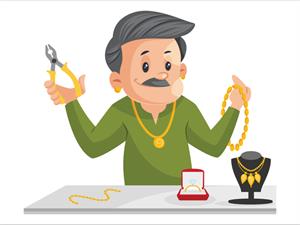
A lazy, dishonest goldsmith
The dancing girl went on to say that when the bricklayer noticed her, he became distracted. It was not her fault, and it was the goldsmith’s fault because she kept wandering down the path because of him. The goldsmith had made a mistake, and he had to take responsibility for that. Later the king said that the poor dancing girl was right. After listening to the statement of everyone, the king thought for a while and finally judged who was the culprit.
The dancing girl went on to say that when the bricklayer noticed her, he became distracted. It was not her fault, and it was the goldsmith’s fault because she kept wandering down the path because of him. The goldsmith had made a mistake, and he had to take responsibility for that. Later the king said that the poor dancing girl was right. After listening to the statement of everyone, the king thought for a while and finally judged who was the culprit.
At last, the king decided that the actual culprit was the goldsmith. So he ordered his messengers to bring the goldsmith. He also stated that the goldsmith might be hiding somewhere. He ordered his messengers to get him immediately.
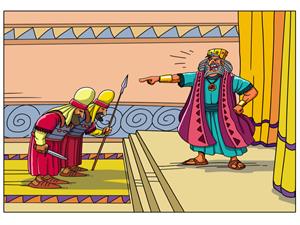
The king ordered his messengers to bring the goldsmith
The goldsmith was hiding in the corner of his shop when the guards from the king’s court went looking for him. He hid in a corner because he was afraid of being caught by the king’s guards. As he knew that the king was a foolish man, he would arrest him for any silly act. Later he was brought in front of the king. The goldsmith had his own story to tell after hearing the case against him. The goldsmith started to narrate his side of justification to the king.
The goldsmith said that “I’m a poor goldsmith”. He said that whatever the dancing girl stated was right. He made many excuses to her to visit his shop again and again. He gave her many reasons because he could not finish the jewellery on time. But it was not his fault. He had an order from a wealthy merchant, and he was in a hurry to get the things ready for a wedding at his home. In addition, he informed the king that the rich men were impatient. They would not wait like ordinary people. The goldsmith was aware that making jewels takes time, but the wealthy merchant was unconcerned about that. The merchant wanted the things to be ready on time. As a result, the dancing girl’s work got delayed.
After hearing the goldsmith’s story, the king wanted to know who was that rich merchant. Finally, the king judged that the wealthy merchant was to blame for everything. The goldsmith’s job was delayed as a result of him. When the goldsmith’s job was postponed, the dancing girl had no choice but to go to his shop. While she was running around, a careless bricklayer became distracted by her and built a weak wall. As a result, the weak wall had collapsed on the poor thief’s head, and he had died on the spot. Later the king asked the goldsmith to tell the name of the wealthy merchant.
The goldsmith said that “I’m a poor goldsmith”. He said that whatever the dancing girl stated was right. He made many excuses to her to visit his shop again and again. He gave her many reasons because he could not finish the jewellery on time. But it was not his fault. He had an order from a wealthy merchant, and he was in a hurry to get the things ready for a wedding at his home. In addition, he informed the king that the rich men were impatient. They would not wait like ordinary people. The goldsmith was aware that making jewels takes time, but the wealthy merchant was unconcerned about that. The merchant wanted the things to be ready on time. As a result, the dancing girl’s work got delayed.
After hearing the goldsmith’s story, the king wanted to know who was that rich merchant. Finally, the king judged that the wealthy merchant was to blame for everything. The goldsmith’s job was delayed as a result of him. When the goldsmith’s job was postponed, the dancing girl had no choice but to go to his shop. While she was running around, a careless bricklayer became distracted by her and built a weak wall. As a result, the weak wall had collapsed on the poor thief’s head, and he had died on the spot. Later the king asked the goldsmith to tell the name of the wealthy merchant.

When the goldsmith delayed the work, the dancing girl visited the shop frequently. The jingling sounds of her anklet distracted the poor bricklayer and so he built a weak wall
When the king asked the name of the wealthy merchant, the goldsmith said his name. Also, we have seen that in "In the kingdom of fools", the narrator did not give any specific names for the characters. He used to address them by their profession.
Then, the goldsmith named the merchant. The merchant was the house's original owner, whose wall had collapsed on the thief's head. Finally, the king believed that justice had completed its journey. It indicated that the story came to an end with the same person who had started it. The thief died below the wall of the same merchant whose jewellery the goldsmith was making. Later, the merchant was rudely called in front of the king once more. He wept as he approached the king, knowing that the king was foolish and would sentence him to death. He claimed that his father had placed the order for the jewellery. Also, he stated that his father was dead, and it was not his fault, and he was an innocent man.
After consulting with his minister, the king concluded that the merchant's father was the murderer. Because of him, the thief died. Since the merchant's father was no longer alive, someone had to take responsibility for his crime. At last, the king declared that the merchant's son, who had inherited everything from his father, would have to bear the consequences. He went on to say that when he first saw the merchant, he had the impression that he was the offender. Later the king said that the merchant would have to die.
Then, the goldsmith named the merchant. The merchant was the house's original owner, whose wall had collapsed on the thief's head. Finally, the king believed that justice had completed its journey. It indicated that the story came to an end with the same person who had started it. The thief died below the wall of the same merchant whose jewellery the goldsmith was making. Later, the merchant was rudely called in front of the king once more. He wept as he approached the king, knowing that the king was foolish and would sentence him to death. He claimed that his father had placed the order for the jewellery. Also, he stated that his father was dead, and it was not his fault, and he was an innocent man.
After consulting with his minister, the king concluded that the merchant's father was the murderer. Because of him, the thief died. Since the merchant's father was no longer alive, someone had to take responsibility for his crime. At last, the king declared that the merchant's son, who had inherited everything from his father, would have to bear the consequences. He went on to say that when he first saw the merchant, he had the impression that he was the offender. Later the king said that the merchant would have to die.
When the king concluded that the merchant was the actual criminal, he ordered his servants to prepare a new stake for the merchant's execution. A stake is a sharp, pointed post that is used to penetrate through something.
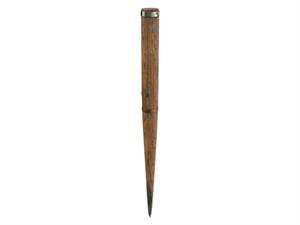
A wooden stake
The servants sharpened the stake after hearing their majesty's command. Finally, they prepared the stake and kept it ready for the final impaling of the culprit. When the new weapon was getting ready, the minister felt that the merchant was very thin and could not be executed on the stake. When he told the king about it, the king became more worried.
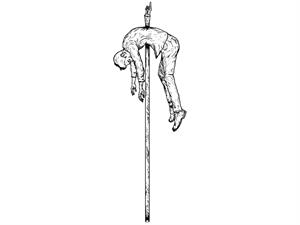
Impaling (A type of punishment given for the offenders)
After listening to the minister's point, the king asked, "What shall we do?" Then the king got an idea right away that they should find a man who was fat enough to be executed on the stake. The merchant would not be executed because he was too thin. They thought of punishing another person instead of the merchant - one who was fat enough to be executed. Finally, the king sent his servants around the kingdom to look for a fat man to be executed on the stake. They found the guru's disciple, who had fattened because of overeating.
When the servants found the fattened disciple, they arrested him. The disciple was taken aback and had no idea what was going on around him. The disciple stated that he was an innocent sanyasi and he had not done anything wrong. Then he inquired of the servants as to where he was being taken.
According to the king's attendants, whatever the disciple claimed could be true. He may be innocent, but they were told to capture a fat guy who could be executed on the stake. Also, he was fit for it, and that's why they were taking him along. When the servants took him to the place of execution, the disciple was reminded of his guru words. Guruji, a wise man, had warned him that the city was full of fools who may hurt him at any time. While the guru asked him to come along with him, the disciple never paid attention to him. Finally, the disciple realised his mistake and believed he should have listened to his guru's advice. While the disciple was waiting for death, he prayed to his guru in his mind.
According to the king's attendants, whatever the disciple claimed could be true. He may be innocent, but they were told to capture a fat guy who could be executed on the stake. Also, he was fit for it, and that's why they were taking him along. When the servants took him to the place of execution, the disciple was reminded of his guru words. Guruji, a wise man, had warned him that the city was full of fools who may hurt him at any time. While the guru asked him to come along with him, the disciple never paid attention to him. Finally, the disciple realised his mistake and believed he should have listened to his guru's advice. While the disciple was waiting for death, he prayed to his guru in his mind.
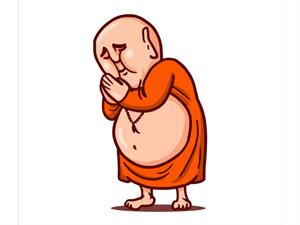
The disciple prayed his guru to save him from execution
Due to the magical abilities, the guru was able to hear his disciple's prayer. The guru could see everything in the vision, including the future, present, and past. Because of the fondness for eating, the disciple found himself in a dangerous and challenging situation. Even though he had not done anything wrong, the king and his minister prepared to put him to death. As a result, the guru arrived to save his disciple from his terrible situation.

The guru could see all the things in his vision
When the guru saw his disciple, he scolded him for not obeying his words. The situation became worse because his disciple did not come along with him. Later, the guruji approached the disciple and murmured something softly.
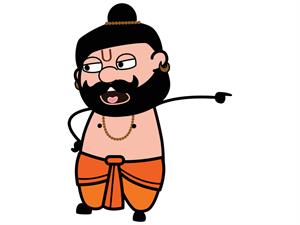
The sage scolded the disciple for not obeying him
Then the guru tried to trap the king using his words. He asked the king who was greater between a guru and his disciple. The king replied that, of course, the guru was greater. As a result, according to the guru, the king must execute him before his disciple. When the disciple heard this, he understood the guruji’s plan and shouted louder as if he wanted to die first. Later the disciple stated that he was brought first by the king’s servant, and he had to be executed first.
When the guru and disciple started arguing about who would die first, the king got confused. He asked the guru that why did he want to die. They had caught the disciple because he was fat, and they wanted a fat man who could be executed on the stake. The guru refused to reply. He stated that he wished to die before his follower. The king was unaware that it was the trap of the guru to save his disciple.
Later the king sensed that there was some mystery behind the guru and his disciple. He was curious to learn more about it. As a result, he asked the wise man to clear his doubts. The guru urged the king to guarantee that he would be killed first if he revealed the secret behind why he wanted to be executed first.
The king promised the guruji that he would execute him first. The guru then took the king aside and explained that they had travelled the entire world but had never seen a city or a ruler like him. He went on to say that the stake they'd use to assassinate the disciple was the stake of justice. It had not yet murdered any criminals because it was so new.
Further, the guru said that the one who would die first on this stake would be reborn as the kingdom's king. The one who would die next would be reborn as the minister of the kingdom. The guru went on to say that he was tired of living like a sanyasi. He and his disciple aspired to be a king and a minister, respectively. As a result, he claimed that the king would execute him first to be reborn as a king, and then his disciple would be executed after him so that he might be reborn as a minister. By stating everything, the guru was trying to trap the king.
The king promised the guruji that he would execute him first. The guru then took the king aside and explained that they had travelled the entire world but had never seen a city or a ruler like him. He went on to say that the stake they'd use to assassinate the disciple was the stake of justice. It had not yet murdered any criminals because it was so new.
Further, the guru said that the one who would die first on this stake would be reborn as the kingdom's king. The one who would die next would be reborn as the minister of the kingdom. The guru went on to say that he was tired of living like a sanyasi. He and his disciple aspired to be a king and a minister, respectively. As a result, he claimed that the king would execute him first to be reborn as a king, and then his disciple would be executed after him so that he might be reborn as a minister. By stating everything, the guru was trying to trap the king.
The king was thrown into deep thought after listening to the guru words. The king didn't want his empire to be taken away from him in the next life. As a result, he took some time to think of an alternative way. He told the servants that the execution would be postponed to the next day.
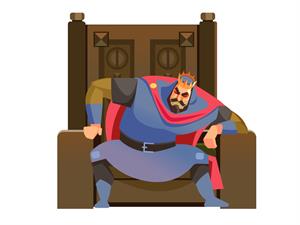
The king was thrown into deep thought
The king thought of speaking with his minister about the secret matter. He remarked that he disliked having someone else rule over his realm. He went on to add that the guru was a holy man and that he would not lie. As a result, whatever he said may be true. Finally, the king and the minister decided to die at the stake and be reborn as king and minister again.
The king told his executioners that the criminals would be sent at night. They should first execute the individual who arrived first and then the second person. They must be cautious and avoid making any mistakes. At night, the king and his minister went to the prison where the guru and his disciple were kept.
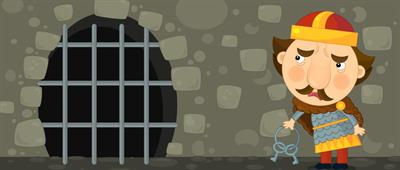
At night, the king went to the prison
The king and the minister disguised themselves in the appearance of the guru and his disciple so that they would resemble them. The servants came and carried them along, putting them on stake for execution, as it was being ordered to the servants earlier. As a result of his brilliance, the guru was able to execute the ignorant king and his minister.
When the dead bodies were taken to be thrown to crows and vultures, the people became panicked to see the dead bodies of their king and his minister. The city was in confusion. As everyone knew that the guru and his disciple were carried out to be killed. Unfortunately, instead of the guru and his disciple, they found the dead bodies of their king and minister.
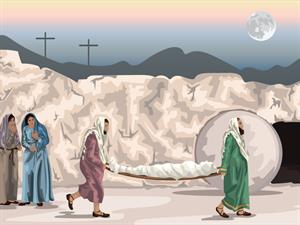
The dead bodies were taken to throw to crows and vultures (only for reference)
Everyone in the kingdom was mourning and discussed the kingdom's destiny. Because the king and his minister were no longer alive, no one was left to look after the kingdom. Some people suddenly remembered the guru and the follower and brought them back as they were about to leave the town secretly. The kingdom's citizens felt they needed a ruler and a minister, so they asked the guru and his disciple to become the kingdom's new king and minister. The disciple agreed quickly, but it took longer to make the guru agree upon this.
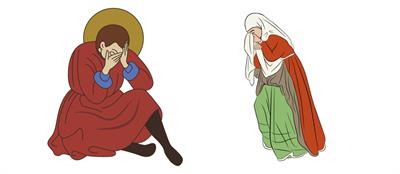
People were mourning because no one was there to take care of the kingdom
Finally, the guru agreed to become the kingdom's king, but only if everyone decided to work during the day and sleep at night. Also, unlike the previous system, the cost of things would vary rather than being one duddu for everything. Everything would be priced differently, just like other places. The guru eventually transformed the kingdom of fools into a normal kingdom.
